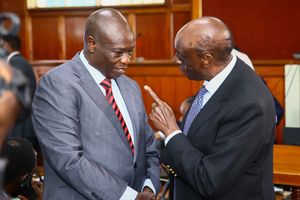Why MPs want more time to consider budget statement

Kibwezi West Mutuse Mwengi tabling his impeachment motion against Deputy President Rigathi Gachagua at the National Assembly in Nairobi on October 8, 2024.
MPs are pushing for more time to scrutinise the Budget Policy Statement (BPS) in the proposed changes to the Public Finance Management (PFM) Act before the National Assembly.
The Public Finance Management (Amendment) Bill 2022 by Uasin Gishu County Woman Representative Gladys Boss targets section 25 (7) of the PFM Act as it proposes to increase the period for which the BPS is to be considered by the House from 14 days to 21 days.
The Bill, scheduled for debate, seeks to implement the resolutions made by the 12th Parliament in its approval of the fifth report of the Procedure and House Rules Committee on the amendments to its Standing Orders.
“The object of this Bill is to amend the PFM Act to increase the period for consideration of the BPS to allow for comprehensive scrutiny of the proposals contained in the statement,” the Bill reads.
The law provides that Parliament shall not later than 14 days after the BPS is submitted to House, table and discuss a report containing its recommendations and pass a resolution to adopt it.
The Bill also seeks to compel the National Treasury to adjust the time required to publish and publicise the BPS after submission to Parliament, from 15 days to 22 days.
BPS is a government document prepared by the Treasury setting broad strategic priorities and policy goals that guide the national and county governments in preparing their budgets for the following financial year and over the medium term.
The PFM Act provides that the National Treasury submits BPS to the National Assembly not later than the 15th of February every financial year, for consideration and approval.
Ms Boss’ proposed amendment comes after the MPs have never agreed on whether the report of the Budget and Appropriations Committee (BAC) on the BPS or the BPS itself can be amended by Parliament.
For instance, in 2022, the House was debating the 2022 BPS and because of the limited time within which to consider the statement, they complained that they did not have enough time to scrutinise the document and inform Kenyans properly.
The debate on the 2022 BPS would later be postponed by then National Assembly Speaker Justin Muturi ostensibly to pave way for consultations with the National Treasury on the areas of possible changes.
The need for consultations was triggered after BAC recommended that the expenditure ceiling of the national executive be slashed by Sh400 billion from Sh2.017 trillion as had been proposed in the 2022 BPS document.
The BPS document had projected an expenditure of Sh3.33 trillion for the country in the 2022/23 financial year but with a whooping Sh846 billion deficit, which BAC warned that if passed as originally published, would be akin to violating the then Sh9 trillion debt ceiling enacted in November 2018.
In October 2023, Parliament passed an amendment to the PFM Act, replacing the Sh10 trillion public debt numerical ceiling with a debt anchor set at 55 percent of the GDP in present value terms.
The need to slash the government’s expenditure was pegged on the projection by the Parliamentary Budget Office (PBO) that by June 2022, Kenya’s debt stock would hit Sh8.6 trillion, which came to pass.
However, Parliament and the Treasury agreed and the BPS was adopted as originally published but with a rider that the latter submits to the House proposed amendments to the Public Finance Management (National Government) Regulations to expand the country’s debt ceiling.
Parliament would later expand the debt ceiling by Sh400 billion to avoid slashing the executive’s estimates as had been proposed by BAC in its report to the House.
Regulation 205 (5) of the PFM (National Government) Regulations requires the regulations on budget ceiling to be approved by parliament- the National Assembly and Senate.
The law mandates the Treasury to include in the BPS document an assessment of the current state of the economy and the financial outlook over the medium term, including macro-economic forecasts and the fiscal responsibility principles and financial objectives including limits on total annual debt.
Also required are the proposed expenditure limits for the national government (executive), including those of Parliament and the judiciary and indicative transfers to the county governments.
The law says that in preparing the BPS, the National Treasury shall seek and take into account the views of the Commission on Revenue Allocation (CRA), county governments, Controller of Budget (CoB), Parliamentary Service Commission (PSC), Judicial Service Commission (JSC), the public and any other interested persons or groups.





